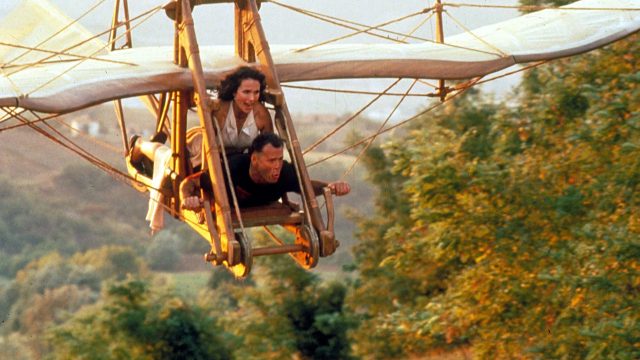Cinematic lore says movies with birds in the title are cursed at the box office, and Hudson Hawk’s performance doesn’t contradict it. A dismal failure upon domestic release, it did quite a bit better internationally, but not enough to save it from bomb status. It was also a critical flop, with most reviewers lambasting it as a disastrous melange of action and slapstick with an overacting cast and an unfunny script. All of that said, to paraphrase the Bard, I come to praise Hudson Hawk, not to bury it. I’ve loved this movie since my first viewing, reveling in the absurdity of the plot, the snappy dialogue, the over-the-top characters, even Bruce Willis and Danny Aiello timing their heists to the tempo of “Swinging on a Star” and “Side by Side.” The bad reviews have always felt to me like everyone wanting more Die Hard Bruce Willis and less Look Who’s Talking Bruce Willis. How soon we all forget that most people knew him as David Addison on the mystery/comedy/drama series Moonlighting. He’s no stranger to physical comedy, which this film has in abundance.
Our recently paroled hero Ernie “Hudson” Hawk just wants to enjoy his new freedom with a hot cappuccino, but his reputation and past accomplishments make him a target for the CIA (James Coburn leading a cohort of operatives lifted almost directly from a secret agent parody), a small-time mob family (Frank Stallone and Carmine Zozzora as the Mario Brothers), the Vatican (Andie McDowell as an undercover nun), and megalomaniacal billionaires out to rule the world (Richard E. Grant and Sandra Bernhard as Darwin and Minerva Mayflower). He travels from New York (his namesake being the cold wind blowing off the Hudson River) to Rome, reluctantly gathering parts to build a Leonard DaVinci invention to convert lead into gold, thus allowing the Mayflowers to disrupt the world financial markets and seize control.
Despite its reputation, the film features some truly inspired performances. Willis’s Hudson Hawk is ultra-cool, and you know that he was never in it for the financial gain: his preference for Rube Goldberg-esque solutions over modern gadgetry shows his motivation is more the challenge of pulling the impossible job. Aiello’s fatherly Tommy Five-Tone is definitely more interested in the money, at least at this point, but he’s so charming, you still can’t help liking him, even when he’s essentially backstabbing his partner. Richard E. Grant and Sandra Bernhard’s highly theatrical turns as the villainous masterminds presage Austin Powers’s Dr. Evil to say nothing of several real-life billionaires in the news today. Would it be much of a surprise if it came out that one of these plutocrats was attempting to take over the world in a scheme right out of a comic book? Beyond the characters,I repeatedly find the action, described demeaningly as cartoonish by most reviewers, a joy to watch. There’s so much playful choreography in the business going on, I’m reminded a lot of early slapstick comedians, like Buster Keaton or Laurel, and Hardy. The repartee between Willis and McDowell is reminiscent of his earlier pairings, like with Kim Basinger in Blind Date and Cybil Shepherd in Moonlighting and classic screwball romances like Bringing Up Baby, Adam’s Rib, or Desk Set.
Hudson Hawk hasn’t quite moved into cult classic territory, but looking at more recent reviews on Letterboxd, it does seem to be gaining a more devoted following. I can’t help but wonder if its disastrous reception had more to do with timing than actual quality. Getting released opposite Backdraft and Thelma & Louise on Memorial Day Weekend in 1991, with What About Bob? still doing well at the box office, the deck was stacked against it, and it was never able to recover from the bad reviews. I’d love to see a renaissance for the comedic works of Bruce Willis (who co-wrote the film), and what better film to launch that rebirth than one that also highlights the genius of Da Vinci?

